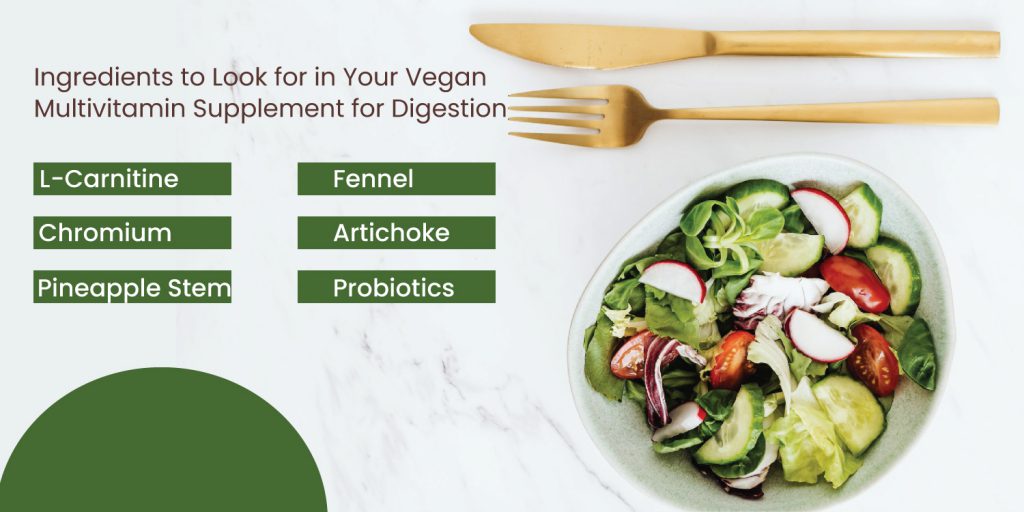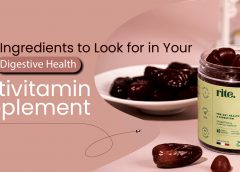Your body needs carbohydrates, proteins, fats, and vitamins for growth, energy, and cell repair, so you consume food and beverages to provide your body with those nutrients. The digestive system — composed of your gut or gastrointestinal tract, liver, pancreas, and gallbladder — plays a critical intermediary or facilitative role in those processes. Indeed, you must have a healthy and fully functional digestive system to maximize nutrient extraction and absorption from your food and drink intake. For this reason, consider supplementing your diet with vegan multivitamin for digestion.
Multivitamins for Digestion: Why You Need Them
Taking multivitamin supplements to aid digestion primarily accomplishes two things.
First, they support gut health, thus, improving digestion. This leads to a whole range of health benefits, including consistent energy levels that allow you to get things done throughout the day, regular and effortless bowel movements, and minimal bloating.
Second, multivitamins designed to strategically modify your gastrointestinal microbiota may help you curb your cravings.
A paper published in BioEssays explores the potential mechanisms through which microbes in the gastrointestinal tract can exercise control over a person’s eating behavior to induce their host to crave foods that they (the microbes) need to improve their vigor and suppress their competitors.
Why Take Vegan Multivitamin Supplements
Vegan multivitamin supplements provide a clean source of vitamins for digestive health. Their ingredients are plant-sourced and plant-based instead of synthetically manufactured in laboratories.
They also satisfy the supplementation needs of those committed to a vegan diet and lifestyle. These supplements do not contain any animal byproducts or animal-derived ingredients.
Ingredients to Look for in Your Vegan Multivitamin Supplement for Digestion
Not all digestive multivitamin supplements are created equal. If you want an efficacious mix of vegan ingredients to effectively support digestive health, look for a multivitamin pack with the following components.

1. Probiotics
Probiotics are live microorganisms (e.g., bacteria and yeasts) that can alter your microbiome or the collection of microorganisms in your body. They are particularly useful in promoting gut health.
The body has a mix of good and bad bacteria. Ingesting probiotics will help you replenish your good bacteria count, which may be decimated with antibiotic intake.
Likewise, taking probiotics helps you maintain microbial balance in your gastrointestinal microbial colonies. A paper in Microbial Pathogenesis reviews studies that point out a potential association between microbial imbalance in the gastrointestinal microbiota and lifestyle-related disorders like diabetes, obesity, and allergic diseases.
There are several types of probiotics. Lactobacillus reuteri (L. reuteri) is a specific type of probiotic from the Lactobacillus genus that you can look for in your multivitamin supplement. It naturally occurs in different areas of the body, including the gastrointestinal tract.
L. reuteri can provide many benefits, including the following:
- It has an anti-microbial activity that helps inhibit and suppress disease-causing microbes (including viruses and harmful bacteria).
- It promotes the development of regulatory T cells, which help prevent autoimmune diseases.
- It helps reduce the production of proteins that lead to inflammation (i.e., proinflammatory cytokines).
- It strengthens the intestinal barrier, helping prevent microbes from translocating from the intestine to the bloodstream (specifically, the body’s systemic circuit that carries oxygen and nutrients to the cells), where they contribute to inflammation and cause disease.
- It can help slow down the development of abdominal and hepatic fat.
2. L-Carnitine
L-carnitine is an amino acid that facilitates fat conversion to energy. Specifically, it transports fatty acids into the cells so they can be processed or metabolized to produce energy.
When you have sufficient L-carnitine in your system, your body can degrade fatty acids in food sources, promoting fat burn and contributing to weight loss.
3. Chromium
Chromium (the trivalent variant) is a trace element that enhances or increases the power of insulin action. Thus, by improving insulin action, it contributes to the healthy metabolism of carbohydrates, lipids, and proteins.
Thus, chromium can help the body maintain normal blood sugar levels and potentially reduce hunger and cravings that can lead to binge eating.
4. Fennel
Fennel is a root vegetable known for its high nutritional and fiber content. It has many health benefits.
It contains potassium, calcium, and magnesium — minerals that naturally decrease blood pressure. It also has dietary nitrates that can help protect and dilate blood vessels. Thus, fennel is considered helpful in maintaining low blood pressure levels. Its high fiber content, meanwhile, helps reduce body cholesterol, thus promoting heart health.
The high fiber content of fennel also translates to digestive benefits. Specifically, it can make you feel fuller, helping you reduce the frequency of your hunger pangs and lowering your overall calorie intake. Additionally, its high fiber content promotes regular bowel movements.
In traditional medicine, fennel is an established digestive aid. It helps reduce inflammation in the gut, inhibit the action of gas-inducing bacteria, and resolve bloating.
Fennel also has vitamin B-6, crucial in metabolizing carbohydrates and proteins into smaller compounds that the body can use for energy.
5. Artichoke
Artichokes contain high levels of antioxidants. They are rich in fiber, vitamins (folate, vitamin C), and minerals (phosphorus, potassium, magnesium).
In traditional medicine, artichoke is used as a cure for indigestion, heartburn, and stomach acidity. A study also indicates it can reduce the incidence of irritable bowel syndrome (IBS).
6. Pineapple Stem
The pineapple stem (also known as the pineapple core) is rich in bromelain, a protein-digesting enzyme. Thus, it aids in the body’s digestive functions.
Bromelain is also believed to help dissolve blood clots (fibrinolytic), prevent swelling (anti-edematous), check blood clot blockages of veins or arteries (antithrombotic), and inhibit inflammation (anti-inflammatory).
Multivitamins for Better Digestive Health
You can use multivitamin supplements to promote good digestion and prevent digestive problems.
Good digestion helps the body maximize the extraction and absorption of nutrients, thereby contributing to the health of organs and supporting the proper and efficient operation of bodily functions.
Meanwhile, preventing digestive problems like IBS, gassiness, bloating, constipation, frequent hunger pangs, and cravings can help ward off medical conditions like lifestyle-related disorders (e.g., diabetes and obesity) and other diseases.

Leave a Reply
You must be logged in to post a comment.